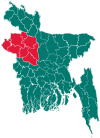Badalgachhi Upazila
Badalgachhi | |
|---|---|
 Aerial view of Somapura Mahavihara | |
 | |
| Coordinates: 24°58′N 88°54′E / 24.967°N 88.900°E | |
| Country | |
| Division | Rajshahi |
| District | Naogaon |
| Area | |
• Total | 213.97 km2 (82.61 sq mi) |
| Population | |
• Total | 206,557 |
| • Density | 970/km2 (2,500/sq mi) |
| Time zone | UTC+6 (BST) |
| Postal code | 6570[2] |
Badalgacchi (Bengali: বদলগাছি) is a Upazila of Naogaon District under Rajshahi Division, Bangladesh.[3]
Geography
[edit]
Badalgacchi is located at 24°58′N 88°54′E / 24.967°N 88.900°E. It consists of 54,001 households and has a total area of 213.97 square kilometres (82.61 sq mi).
Demographics
[edit]According to the 2011 Census of Bangladesh, Badalgachhi Upazila had 54,001 households and a population of 201,342. 36,957 (18.36%) were under 10 years of age. Badalgachhi had a literacy rate (age 7 and over) of 49.55%, compared to the national average of 51.8%, and a sex ratio of 1002 females per 1000 males. 6,357 (3.16%) lived in urban areas.[5] Ethnic population was 10,799 (5.36%), of which Oraon were 3,661.[6]
In 1991, the population of Badalgacchia was 176,010. Males constitute 51.34% of the population, and females account for 48.66%. Badalgachi has an average literacy rate of 28.4% for persons seven years and older, which is below the national average of 32.4%.
Points of interest
[edit]Somapura Mahavihara is situated in Paharpur village.
Administration
[edit]Badalgachhi, foemed as a Thana in 1807, was converted into an upazila in 1983.[7]
The Upazila is divided into eight union parishads: Adhaipur, Badalgachhi, Balubhara, Bilasbari, Kola, Mathurapur, Mithapur, and Paharpur. The union parishads are subdivided into 247 mauzas and 238 villages.[5]
References
[edit]- ^ National Report (PDF). Population and Housing Census 2022. Vol. 1. Dhaka: Bangladesh Bureau of Statistics. November 2023. p. 402. ISBN 978-9844752016.
- ^ "Bangladesh Postal Code". Dhaka: Bangladesh Postal Department under the Department of Posts and Telecommunications of the Ministry of Posts, Telecommunications and Information Technology of the People's Republic of Bangladesh. 21 October 2024.
- ^ Md. Mukhlesur Rahman (2012). "Badalgachhi Upazila". In Sirajul Islam and Ahmed A. Jamal (ed.). Banglapedia: National Encyclopedia of Bangladesh (Second ed.). Asiatic Society of Bangladesh.
- ^ Population and Housing Census 2022 - District Report: Naogaon (PDF). District Series. Dhaka: Bangladesh Bureau of Statistics. June 2024. ISBN 978-984-475-233-7.
- ^ a b "Bangladesh Population and Housing Census 2011 Zila Report – Naogaon" (PDF). bbs.gov.bd. Bangladesh Bureau of Statistics.
- ^ "Community Tables: Naogaon district" (PDF). bbs.gov.bd. Bangladesh Bureau of Statistics. 2011.
- ^ "Badalgachhi Upazila - Banglapedia". en.banglapedia.org. Retrieved 2023-02-23.

